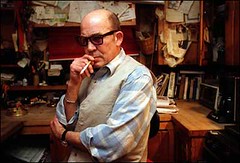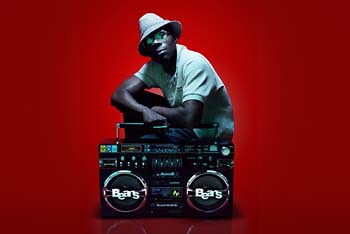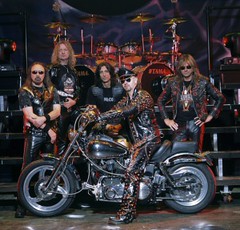
Straight Into Frantic Oblivion
"These novels will give way, by and by, to diaries or autobiographies - captivating books, if only a man knew how to choose among what he calls his experiences and how to record truth truly." (Ralph Waldo Emerson)
"So we shall let the reader answer the question for himself. Who is the happier man, he who has braved the storm of life and lived, or he who has stayed securely on shore and merely existed?" (Hunter S. Thompson, age 16)
In September 1973 Hunter S. Thompson wrote to David Butler, his editor at Playboy magazine. Butler had commissioned a piece on big game fishing in the Mexican Gulf, an assignment the writer had pursued with his usual energy. The resulting article, The Great Shark Hunt, was initially rejected on the grounds it barely included mention of fishing. But it did mention the enthusiastic consumption of large quantities of drugs and alcohol.
Thompson's letter made it clear the editor knew what he was getting himself in for, saying "A journalist into Gonzo is like a junkie or an egg sucking dog; there is no known cure."
The writer had the courage of his convictions. He had developed his own style of writing and now they were all stuck with it. Thompson was happy with this situation. After all, no one asked his heroes - F. Scott Fitzgerald, Bob Dylan, Muhammad Ali - to change their methods. He'd found his voice and no one would change it.
Born in Louisville, Kentucky in 1937, Thompson's youth was a cocktail of hell raising and literature. He was in prison on the day of his high school graduation, subsequently joining the Air Force to escape the consequences of his wayward behavior.
Following a spell writing sports news for the base newspaper, Thompson contrived a discharge from the forces, and pursued a journalism career in New York. A string of hilariously unsuccessful jobs later, and he retreated to upstate New York to write his first novel, the unpublished Prince Jellyfish.
One thing is clear about the young writer - he was committed to the craft and did everything he could to learn how a writer's mind works. This included typing tracts of Hemingway and Fitzgerald novels, to nail down the rhythm and structure of great literature.
For it was literature that was his first love - his journalism was imbued with the spirit of it. He said of his Gonzo work that "It is a style of 'reporting' based on William Faulkner's idea that the best fiction is far more true than any kind of journalism."
The seeds of this are found in Thompson's second novel, The Rum Diaries, written in 1962, yet only published in 1998. Based on the writer's own experiences, it tells the story of a reporter working for an English language newspaper in a rum soaked and dissolute Puerto Rico. Drawing on the Beat writers, The Rum Diaries exhibits the beginnings of Thompson's hyperactive descriptive style.
Traveling through South America, he filed a series of articles for the National Observer on subjects such as smuggling and democracy in Peru. These were well received by the journalism establishment of the East Coast, which saw Thompson in demand upon his return home in 1963.
In the United States, Thompson sensed a nascent movement. An ideology was forming which would peak during the Summer of Love in 1967. Like Bob Dylan, Thompson became a participant/observer of this scene, extolling its virtues while criticizing its excesses.
Settling in San Francisco with his new wife Sandy, Thompson became immersed in the burgeoning counter-culture. The Berkeley Free Speech Movement, Ken Kesey, the Hell's Angels, the Haight Ashbury. He was one of the few writers who covered the scene from the inside, translating it for America at large. While this put paid to his freelance arrangement with the National Observer, it created new opportunities.
Carey McWilliams, editor The Nation, commissioned Thompson to do a story on the vicious motorcycle gang the Hell's Angels. With an inside contact, he gained the trust of this closed fraternity, leading to him riding with them for a year - and ultimately being badly beaten by them. This intensive first hand research became the basis for his first book, 1966's Hell's Angels: The Strange and Terrible Saga of the Outlaw Motorcycle Gang.
A humming, energetic snapshot of the gang, Hell's Angels was a classic of the New Journalism that Tom Wolfe was espousing. This placed the journalist at the heart of his subject, with no consideration for outmoded ideals such as objectivity. A combination of journalism, fiction and opinion, it was enamored with raw experience over any pretence of straight reporting.
This idea perfectly fitted Hunter S. Thompson's outlook, as he'd long since rejected establishment values. "By the time I started Hell's Angels I was riding with them and it was clear that it was no longer possible for me to go back and live within the law. But an outlaw can be defined as somebody who lives outside the law, beyond the law, not necessarily against it."
The fundamental values of the hippie movement, the words of Bob Dylan, writers such as Wolfe, Kesey and Allen Ginsberg, and psychedelic drugs all had an impact on Thompson. Through this filter he glimpsed a possible America that contrasted greatly with the slowly unraveling one he inhabited. A sense of righteousness and fury would imbue his writing from then until his death. As he said, "Yesterday's fun had been officially transmogrified into tomorrow's insane nightmare."
Thompson began contributing political writing to Rolling Stone magazine as their National Affairs correspondent. Haunted by the beatings he'd seen first hand at the notorious Republican convention in Chicago in 1968, the events at York State, Vietnam, and the rise of Richard Nixon, the correspondence carried baiting, anti-right wing sentiments.
While working prodigiously hard as a freelance journalist, Thompson began researching another book in the wake of Hell's Angels success. With a theme based around the 'Death of the American Dream', he attempted to weave together all the factors contributing to the national malaise. It was a vast idea that he could not ultimately pin down sufficiently to hang a book on.
Well, not as he'd originally conceived. In June 1970, Thompson suggested covering the Kentucky Derby to Scanlan's Monthly. Teamed with genius English illustrator Ralph Steadman, the writer watched the crowd through whisky soaked eyes, scrawling down his observations. When it came time to edit these ramblings into something coherent, Thompson began tearing pages straight from his notebook and inserting them unedited into the story, The Kentucky Derby is Decadent and Depraved.
"I was sure it was the last article I was ever going to do for anybody," he told Playboy. "Then when it came out, there were massive numbers of letters, phone calls, congratulations, people calling it a 'great breakthrough in journalism.'"
Thompson pursued this Gonzo style of writing, which came to fruition in 1971 with the work for which he is best known, Fear and Loathing in Las Vegas. Working on a Rolling Stone story concerning the possible police murder of Chicano journalist Ruben Salazar in Los Angeles, Thompson was dealing with radical lawyer Oscar Acosta. Unable to get Acosta in private, he suggested a trip to Las Vegas, where he had an assignment from Sports Illustrated to write 250 words on the Mint 500 desert race.
Using the same technique as the Kentucky Derby piece, Thompson wrote the Las Vegas book as levity from the heavy work on the Salazar piece. Rolling Stone editor Jann Wenner loved the excerpts he saw, and published two large sections. Drug soaked, outrageous and innovative, Fear and Loathing in Las Vegas was an instant classic.
"As true Gonzo journalism, this doesn't work at all - and even if it did, I couldn't possibly admit it. Only a goddamn lunatic would write a thing like this and then claim it was true."
Then the Hunter S. Thompson legend began to take over. While he was a serious writer, and indeed a serious political force, a public persona had emerged. This saw Thompson as a caricature of himself, a drug fucked literary loony, a sideshow attraction sending missives from the frontline of American affairs. This was untrue, as Thompson's next book was his most incisive, yet the legend would stay with him for the rest of his life.
In 1970 Thompson had run for office as Sheriff of Aspen, near where he had settled in rural Woody Creek. His 'Freak Power' campaign was conceived to shake up the blue blooded straights that ran the town. Very nearly successful, it distilled in him a belief that a sea change in American politics was possible.
And so, in 1972 he relocated to Washington DC to cover the election campaign for Rolling Stone. It would be one of his toughest assignments, resulting in the book Fear and Loathing on the Campaign Trail '72. Early on Thompson sensed that Democrat Senator George McGovern had a sniff at edging out Republican incumbent Nixon for the presidency. This proved not to be the case, but Thompson's political heft was now recognised. Later in the 1970's, he would be influential in Jimmy Carter's successful bid for election.
While his later books contained some of the genius found in the Fear and Loathing editions, nothing ever really came close to reaching those heights. Over subsequent years Thompson was criticized for crushing his talent through chemical bingeing, for becoming a victim of his public persona. Some of this was true, but the reality was that Thompson's output through the late 1960s and early 1970s was prolific and virtually faultless. He was something of a rock star writer, and like Dylan, his best work was irrevocably connected to the times.
His voice during that period was an important part of the milieu, and never again would it be so charged. His later work would be compared to it, even though the times had changed and he could never capture the public's imagination as he once had. As his earlier audience drifted into middle age and away from their youthful idealism, he was condemned to being something of a relic. But he never lost faith in the ideology that had been espoused by the greatest minds of his generation, and he kept preaching that line until he died.
A first hand witness to many of the epochal events of that era - the Summer of Love, Chicago '68, Watergate, the fall of Saigon, the Rumble in the Jungle - his unerring perspective offered an antidote to the party line. As Nelson Algren said, "Now that the dust of the '60s has settled, his hallucinated vision strikes one as having been the sanest."
Conjecture over why he chose to take his own life may be a waste of time, but despair in these times would almost certainly have been a factor. He was in pain, and his enjoyment of life would soon be gone. Worse, he had to endure another four years under George W. Bush, of whom he said before the election, "He talked like a donkey with no brains at all." No matter how like a drug politics was to him, this was too much. This was worse than Nixon.
So now he roams 'The Edge' - the mythical place he wrote of in Hell's Angels. The Edge, where you are truly alive, risking it all for another hit of undiluted adrenalin, where you are master of your destiny and no one can touch you.
"The Edge... There is no honest way to explain it because the only people who really know where it is are the ones who have gone over. The others - the living - are those who pushed their control as far as they felt they could handle it, and then pulled back, or slowed down, or did whatever they had to when it came time to choose between Now and Later."
"Well, at least I'll know I was there, neck deep in the madness, before the deal went down, and I got so high and wild that I felt like a two-ton Manta Ray jumping all the way across the Bay of Bengal."
Gavin Bertram.




